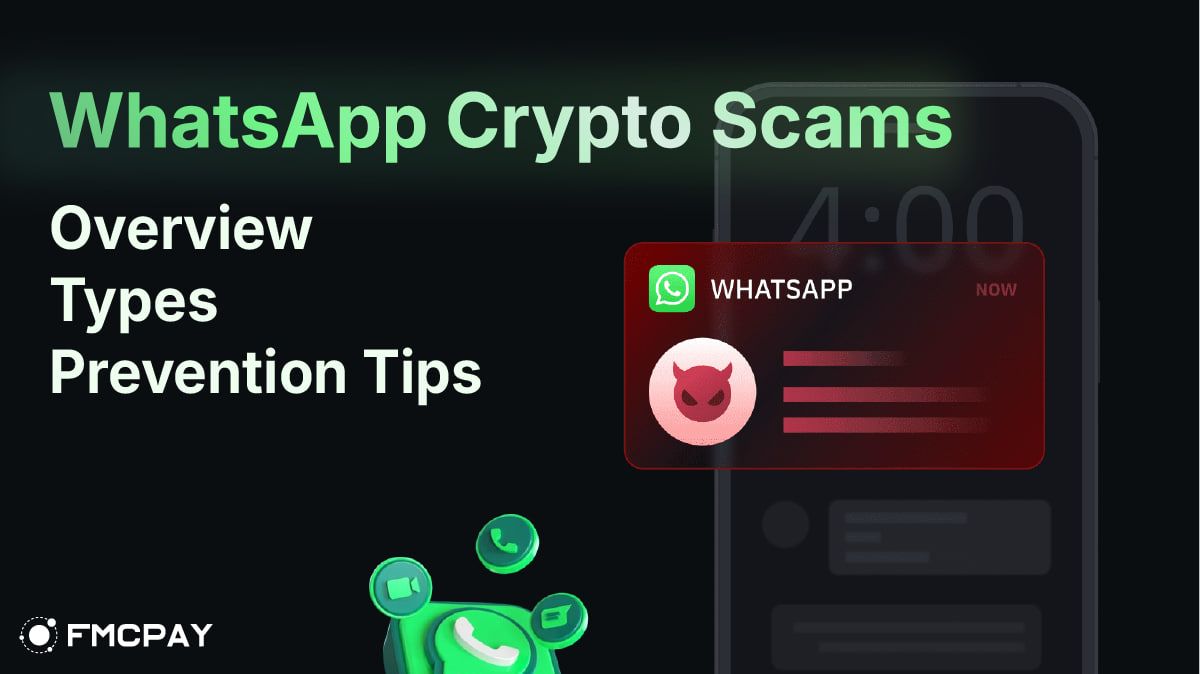With the explosive growth of cryptocurrency, scammers have found new ways to exploit messaging platforms. WhatsApp crypto scams are becoming more common, targeting users with promises of quick returns and free tokens.
Join FMCPAY in this article to explore why WhatsApp has become a prime target for crypto scams, look at the most prevalent scams, and top prevention tips to keep your crypto safe.
1. A Brief Overview of WhatsApp
Launched in 2009 and later acquired by Facebook (now Meta) in 2014, WhatsApp provides end-to-end encryption, allowing private and secure conversations. Until late 2024, WhatsApp has grown into one of the most powerful and widely used messaging platforms worldwide, with over 2.7 billion active users.

Its straightforward interface, robust encryption, and ability to connect people across the globe have made it a dominant force in mobile communication. WhatsApp’s popularity spans across diverse age groups and regions, making it a go-to for everything from personal chats to professional exchanges.
Its massive user base and convenient features make it a convenient platform for crypto enthusiasts to discuss trends, trade ideas, and make investment plans.
2. Why Are There So Many Crypto Scams on WhatsApp?
As cryptocurrency gains mainstream attention, scammers are quick to target popular communication platforms. WhatsApp’s features, combined with the growing excitement around crypto investments, make it a perfect tool for fraudulent activities. Below are some reasons why there are so many WhatsApp crypto scams:
2.1. High User Base
WhatsApp’s popularity provides a vast network of potential victims, including those new to cryptocurrency who may be unaware of common scam tactics. Scammers easily blend into WhatsApp’s large user base, allowing them to approach thousands of users without raising immediate suspicion.
2.2. Encrypted Messaging
The end-to-end encryption on WhatsApp is designed to protect user privacy, which is beneficial for legitimate users but also provides a layer of security for scammers. WhatsApp accounts can be created quickly, allowing scammers to operate without much oversight. This makes it difficult for authorities to trace WhatsApp crypto scams, emboldening them to continue targeting unsuspecting users.
2.3. Easily Accessible Phone Numbers
WhatsApp itself uses phone numbers as the primary means of connecting users, meaning that if a scammer obtains a number, they can directly message the user on the app without needing mutual approval.
In 2022, a data leak revealed that about 500 million WhatsApp phone numbers from 84 countries were exposed. This huge trove of data provides malicious actors with the means to fabricate fake identities online or gain unauthorized access to other users’ accounts, facilitating their ability to lure additional victims into WhatsApp crypto scams.
2.4. Ease of Sharing Multimedia and Links
WhatsApp enables easy sharing of images, videos, and links, which scammers often exploit. Fake investment links, photos of “proof of payment,” and screenshots of successful trades are commonly used to lure people into WhatsApp crypto scams. They may even use screen-sharing techniques to impersonate technical support, tricking users into divulging their wallet information or private keys.
Together, these factors create a fertile environment for scammers to operate, so it’s important for users to stay vigilant with all kind of WhatsApp crypto scams.
Related topic: Proof of Payment Scams: Key Warning Signs & How to Avoid
3. Common WhatsApp Crypto Scams
In recent years, WhatsApp crypto scams have surged in frequency and complexity. They appear in numerous forms, from hackers attempting to steal account information to fraudsters imposing as family members, friends, romantic partners, or employers requesting money transfers.
These WhatsApp crypto scams have evolved significantly, showcasing a wide range of tactics and strategies. However, they share the same objective: making users reveal personal information, downloading malware, or sending funds.
Here, we delve into some of the most common WhatsApp crypto scams that you should be aware of, illustrating how they operate and the tactics they use to exploit victims.

3.1. Fake Investment Opportunities
One of the most prevalent types of WhatsApp crypto scams involves fraudulent investment opportunities. Scammers often present themselves as financial experts or cryptocurrency gurus, claiming they have insider information about upcoming coin launches or market trends. They create a sense of urgency by asserting that their investment schemes offer guaranteed high returns with little risk.
How It Works:
- Scammers typically create professional-looking brochures, presentations, or videos that highlight the supposed benefits of the investment.
- They often use social proof, showcasing testimonials from fake or coerced individuals to add credibility.
- Victims are urged to invest quickly, often by sending cryptocurrency to a wallet address or transferring money via methods that are difficult to trace.
Red Flags:
- Promises of guaranteed returns or “risk-free” investments should raise immediate suspicion.
- Pressure tactics that rush you into making a decision can be a strong indicator of a scam.
- Lack of transparency about the investment process or failure to provide verifiable information about the investment strategy.
3.2. Impersonation Scams
Impersonation are another major category of WhatsApp crypto scams. Scammers often create fake accounts that resemble well-known figures in the cryptocurrency space, such as influencers, celebrities, or even customer support representatives from legitimate exchanges. They may also impersonate someone from your contacts to gain your trust.
How It Works:
- Scammers reach out to potential victims, often using official-looking profile pictures and names.
- They may send messages asking for help or investment advice, slowly building a rapport before pitching their scam.
- Once trust is established, they request money for “investment opportunities” or ask for personal information under the guise of needing to verify your identity.
Red Flags:
- Check the contact number and verify it through official channels before responding to any investment requests.
- Be wary of unsolicited messages, especially if the sender is asking for money or sensitive information.
- If the conversation seems too good to be true, it probably is.
3.3. Fake Crypto Giveaways
Fake giveaways are an increasingly common tactic among WhatsApp crypto scams. In these scams, individuals are promised free cryptocurrencies but the process to withdraw them into e-wallet or bank account is often very complicated. Normally, the prey will need to pay a “small processing fee” or send a certain amount of cryptocurrency to the scammer’s wallet address.
How It Works:
- Scammers often create posts or messages announcing giveaways purportedly sponsored by reputable crypto projects, luring people in with the promise of free money.
- Victims are instructed to send a small amount of cryptocurrency as a “verification fee” or to prove they are real participants.
- Once the scammers receive the initial payment, they may request additional payments or disappear entirely, leaving victims with nothing.
Red Flags:
- Legitimate giveaways usually do not require participants to send money upfront.
- Look for official announcements from the project’s verified channels before participating in any giveaways.
- Be cautious of high-pressure tactics urging you to act quickly.
3.4. Phishing Links and Fake Wallets
Other common WhatsApp crypto scams that you may encounter are phishing attack and fake wallet. Scammers may send malicious links that direct victims to fake websites that mimic legitimate crypto platforms. These links can compromise your account, leading to stolen funds and personal data.
How It Works:
- Scammers may send a message claiming that your account has been compromised or that there is an urgent update required. They provide a link to a fake website that appears similar to the legitimate site.
- Victims who click on the link are prompted to enter their login credentials, which are then captured by the scammers.
- Some scammers even use fake wallet apps to trick users into downloading malware that can further compromise their devices.
Red Flags:
- Always check the URL before entering any credentials. Legitimate websites will use secure HTTPS connections.
- Be cautious of messages claiming urgent account issues; legitimate companies will never ask for sensitive information via WhatsApp.
- Avoid clicking on unsolicited links or downloading attachments from unknown sources.
3.5. Pump-and-Dump Schemes
Pump-and-dump schemes involve a group of scammers who manipulate the price of a cryptocurrency to profit from unsuspecting investors. These schemes can operate through WhatsApp groups where members are encouraged to buy into a specific low-value coin.
How It Works:
- Scammers coordinate to artificially inflate the price of a cryptocurrency by promoting it aggressively within WhatsApp groups, using enticing language about future price increases.
- Once the price reaches a certain level due to the influx of buyers, the scammers sell their holdings for profit, causing the price to crash and leaving latecomers with worthless coins.
- This type of scam thrives on FOMO (fear of missing out), creating a sense of urgency that pressures individuals to buy quickly.
Red Flags:
- Be skeptical of any group or message promoting “hot tips” on specific coins, especially if the coin is obscure or has no verifiable track record.
- Research the coin independently and look for credible news articles or analyses before making any purchases.
- Always question the motives behind aggressive promotions; if it feels rushed, it’s likely a scam.
Read more: 9 Most Common Cryptocurrency Scams & How to Avoid Them
4. Top 5 Tips to Avoid WhatsApp Crypto Scams
While scams are cunning and pervasive, there are measures you can take to protect yourself. Here are the top five tips for safeguarding your assets and personal information from WhatsApp crypto scams:

4.1. Verify the Identity of Contacts
If someone reaches out with an investment opportunity or requests sensitive information, verify their identity through trusted channels. Contact individuals directly through official websites or other communication methods before engaging in any transactions. Avoid relying solely on WhatsApp as a verification method.
4.2. Be Skeptical of Unrealistic Promises
If an offer sounds too good to be true, it probably is. WhatsApp crypto scams often lure victims with promises of quick, high returns. Always research the offer independently, checking for legitimate sources, reviews, and previous scam reports. A cautious approach will help you spot red flags and avoid falling into a scammer’s trap.
4.3. Avoid Clicking on Suspicious Links
Phishing scams are rampant on WhatsApp, where malicious links can appear even from contacts you trust (if their accounts have been compromised). Never click on unfamiliar links or download attachments from unknown sources. Use only official links from reliable sources to access crypto wallets, exchanges, or news.
4.4. Secure Your Personal and Wallet Information
Your private keys and wallet information should never be shared over WhatsApp or any other messaging platform. Scammers often pose as support representatives, asking for personal details to “resolve” an issue. Remember that legitimate companies will never ask for private keys or sensitive information over WhatsApp.
4.5. Report and Block Suspicious Accounts
WhatsApp allows users to report and block contacts who appear suspicious. If you encounter someone promoting fake investment schemes or requesting sensitive information, report their account. By reporting scammers, you not only protect yourself but also help reduce the reach of these WhatsApp crypto scams on the platform.
Conclusion
The rise of WhatsApp crypto scams highlights the critical need for vigilance in online communication, particularly within the cryptocurrency space. By staying informed and cautious, you can safeguard your crypto journey from malicious actors, enabling you to enjoy a more secure experience on popular messaging platforms.
While WhatsApp can be a valuable tool for connecting with others in the crypto community, it’s vital to recognize and avoid potential WhatsApp crypto scams. Leveraging secure platforms like FMCPAY exchange can enhance your protection against fraud, ensuring that your transactions remain safe.

